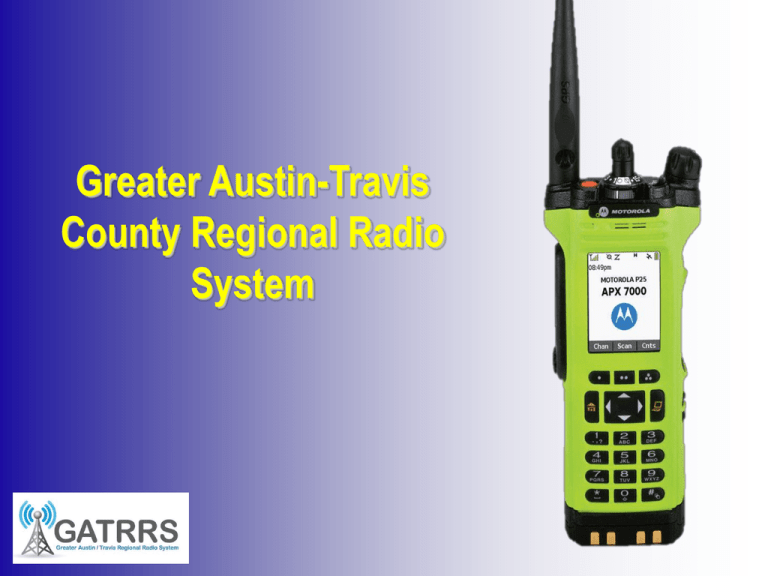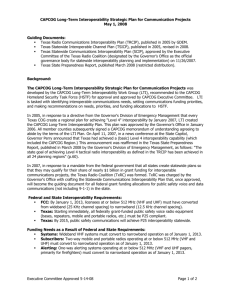Greater Austin-Travis County Regional Radio System
advertisement

Greater Austin-Travis County Regional Radio System Greater Austin-Travis County Regional Radio System GATRRS Overview • GATRRS is the Greater Austin-Travis County Regional Radio System. • The system went live in 2003 as a trunked, simulcast, 800 MHz, P-25 two-way voice radio system serving Austin, Travis County, Austin Independent School District, and UT-Austin. • Since 2003, many systems have been connected to the GATRRS master site for improved interoperability. Greater Austin-Travis County Regional Radio System GATRRS 2003 Greater Austin-Travis County Regional Radio System GATRRS 2013 GATRRS Overview Greater Austin-Travis County Regional Radio System GATRRS Overview: Terms Defined • Trunked: A way to share a limited number of frequencies with a large number of users. • Term comes from railroad, telegraphy, and telephone worlds: “Trunk lines” connected major cities together and telephone switching offices to each other. Greater Austin-Travis County Regional Radio System GATRRS Overview: Terms Defined • Trunked: A way to share a limited number of frequencies with a large number of users. Greater Austin-Travis County Regional Radio System GATRRS Overview: Terms Defined • 800 MHz: “Eight-hundred megahertz” is a frequency band commonly used by local government public safety. AustinTravis, Bastrop, Lee, and WilCo use 800 MHz channels. • 700 MHz: Also available to local public safety. The DPS Capitol site (part of GATRRS) uses 700 MHz; the Caldwell system uses 700 and 800 MHz. • VHF: “Very High Frequency” band in the 150 MHz range for public safety. Blanco, Burnet, Llano, MRGDC, and STDC use VHF channels on their trunked GATRRS systems. Greater Austin-Travis County Regional Radio System What is Interoperability? • Ability of first responders to communicate, via voice or data, with other first responders from other agencies in real time. • Cross-jurisdiction, cross-discipline, on demand, as authorized during multi-agency response. • Can be accomplished in several ways. Greater Austin-Travis County Regional Radio System Who can interoperate on GATRRS? • • • • • Law Enforcement Fire Services Emergency Medical Services Public Utilities Hospitals (through Capital Area Trauma Regional Advisory Council) • State and Feds (Texas offices) – DPS, FBI, ATF, Tx Military Forces Greater Austin-Travis County Regional Radio System Interoperability Governing Documents • National Emergency Communications Plan (federal) • Texas Statewide Communications Interoperability Plan (SCIP covers all Texas public safety agencies). • Texas Statewide Interoperability Channel Plan (covers all Texas public safety agencies). • GATRRS Interoperability Plan (covers all GATRRS members). Greater Austin-Travis County Regional Radio System Local, Regional, Statewide Governance • Interlocal Agreements and Memos of Understanding. • Regional interoperability committees (CAPCOG Long-Term Telecommunications Interoperability; Region 49 Planning and Review; Capital Area Emergency Communications District). • Texas Interoperable Communications Committee. Greater Austin-Travis County Regional Radio System Local, Regional, Statewide Governance Local Regional GATRRS Governing Board CAPCOG Exec Committee GATRRS Operating Board CAPCOG Homeland Security Task Force Statewide Governor, DPS Director Statewide Interop Coordinator SCIP Executive Council GATRRS Advisory Team CAPCOG Long-Term Interop Committee SCIP Steering Committee Greater Austin-Travis County Regional Radio System Local, Regional, Statewide Governance Common Challenges: • • • • Infrastructure and Equipment Costs Sustainment Funding Adoption of Standard Operating Procedures End-User Training and Exercises









